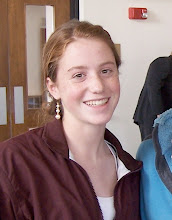 After my run!!
After my run!! View of Sitka from the top of Gavin Hill
View of Sitka from the top of Gavin Hill SNOW!!
SNOW!!
After many days of cold, rainy weather the sun has finally come out again in Sitka. I spent most of the week at the whale research office doing more humpback whale fluke categorizing and also designing a poster that includes pictures of many of the whales that live primarily in Southeast Alaska. The poster will be sold to raise money for the whale research. I will post of picture of it as soon as we get a mock-up printed.
Last night I participated in an event called "Only Fools Run at Midnight". It was a 5k road race through downtown Sitka that started at midnight. There were costumes, music and food; it was a really fun event. The temperature was perfect and there was a big full moon out- it was the perfect night for a run. I finished in about 25 minutes, not too bad. I was worried that I wouldn't be in great shape after taking a week off from running for the fishing trip, but I felt pretty good.
The only real low-point of the week was that we don't have cable at the house and I couldn't get the USA vs. Ghana world cup game to stream live on my computer! It was torture not to be able to see the game, but I did get periodic updates via text message thanks to Grady, my buddy back in Maine. I'm going to have to make friends with someone here who has cable so I can see the final game!
Today the sun finally came out and I took the most gorgeous hike up Gavin Hill (poorly named, it's a pretty legit mountain) with the dogs. The views were absolutely spectacular. I tried to capture it in the pictures above, but they don't really do it justice. The trail leads up through these woods that have an almost rainforest feel to them, then you get above tree line and there are these meadows with an amazing array of wild flowers. The view was of the snow capped mountains on one side and the ocean with Sitka down below on the other side. It was breathtaking, I could have stayed up there all day.

















